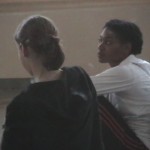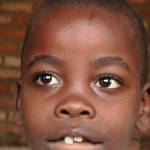The East African Nights of Tolerance (EANT) Festival is an initiative organized by Amizero Dance Kompagnie of Rwanda and sponsored by the Prince Claus Foundation. From November 3 to 10, 2012, dance companies from Rwanda, Uganda, Democratic Republic of Congo, Kenya, Tanzania, the UK and the USA, have gathered together to present choreographic works on the themes of conflict-resolution and peace-building. Rebecca Davis Dance Company (RDDC) is representing the USA with its production of Darfur: The Ballet at the festival.
In addition to nightly performances, festival participants are learning about a piece of Rwandan history: the 1994 genocide. On Wednesday, November 7, a group of 28 dancers from around the world went to the Gisozi Genocide Memorial Museum in Kigali. I have been to the museum and memorial several times, but I have never been there with such a diverse group of African artists – in fact, I am the lone Caucasian and one of only four females.
At the outset, I will just say that is impossible to describe the emotions one experiences as she passes through the Gisozi Memorial. There are moments when I think, “The history of the colonial period explains the roots of this astronomical atrocity.” Two minutes later, I find myself thinking, “There is no rational explanation for why people would kill babies and two year-olds with machetes and grenades.” The Memorial is a lasting reminder that imposing artificial divisions – as the colonial powers did – creates an atmosphere of tension that can be manipulated into war and genocide. Yet, it also reminds the international community of our failure to prevent the loss of innocent life when we had the information and the capacity to do so.
Following this visit to Gisozi, the dancers gathered for a round-table discussion at Papyrus, a local restaurant and performance space in Kigali. Here, we exchanged our views on how the arts can be used as a tool to promote peace and challenge political and social forces that sometimes work against an otherwise harmonious society. The group represents a huge breadth of experience: dance artists who work with street children in Zimbabwe or demobilized child soldiers in Congo and Rwanda; choreographers who survived the 1994 Tutsi Genocide and use spoken word and contemporary dance to express their own stories; and directors tackling issues such as blood diamonds, freedom of expression and individual identity. Perhaps one of the most pointed comments in the discussion was verbalized by Carole Karemera: “It is better to be concerned before it is your time.”
One divisive point of conversation was whether artists should have a specific message that is conveyed in their work. Sekombi Katondolo argued that the artist should have the right to make work just to create – perhaps the purpose is “to have fun.” Other artists, such as myself and Wesley Ruzibiza, believe that the artist’s voice should be used to say things that may otherwise be avoided or forgotten. We want our audience to think more than we want them to enjoy. Each has the right to choose in which realm he will place his work, but it is a decision that needs to be deliberately taken by the artist.
In the evening, there were three solo performances presented: Ceci n’est pas Noire (Alesandra Seutin), 42 Kilometer (Papi Ebotani), and To Be or Not To Be (Shane Muhimanyi). Alesandra, a dancer and spoken word artist from Zimbabwe and living in the UK, explored misconceptions people make when they pass another person. She wanted to find a way to share her story so that others could feel free to search and find their own identities. Papi, a dancer from Democratic Republic of Congo, used contemporary movement to illustrate the path he is following to find himself in life, a life which has surpassed 42 years. In his words, “my story is a voyage” and it is shaped by “resistence, determination and patience.” Shane, a Rwandan dancer who moved to the UK after 1994, presented a work choreographed by Wesley Ruzibiza, Amizero’s Director and the Coordinator of the EANT Festival. It uses an original text that asks, “What is freedom?” and “What is love when you have lost everyone you love?” Shane’s movement is based on the gestures he remembers from his mother before her life was taken during the genocide.
Each of these pieces was entirely different but all shared the theme of the festival: dance as a tool and form of expression around the issues of conflict-resolution and peace-building. As artists, we have a special way we can contribute to the awareness and dialogue that needs to take place for stable living conditions to emerge in every society around the world. Then, we will have a reason to dance for celebration.
Rebecca Davis is the Founder of Rebecca Davis Dance Company (RDDC).

